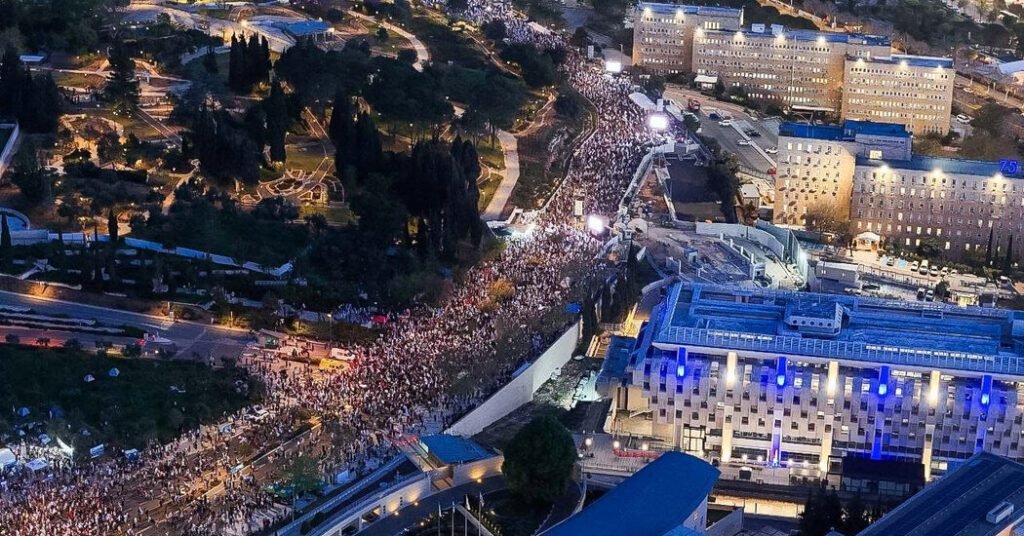Thousands of Israelis filled the streets outside the Knesset, Israel’s parliament, in Jerusalem on Sunday to demand early elections, in one of the biggest protests against Prime Minister Benjamin Netanyahu’s government since the start of the war between Israel and Hamas.
Sunday’s demonstration in Jerusalem came just a day after thousands took to the streets of Tel Aviv in a separate anti-government protest and as Mr Netanyahu faces growing anger from Israelis who believe he has put his political survival ahead of the wider interests of the Israeli people. It also came as he went into surgery to treat a hernia on Sunday night.
The protest in Jerusalem is expected to last four days, with some protesters planning to remain in a cluster of tents near Parliament. On Sunday, several carried signs calling for the “immediate removal” of Mr Netanyahu, while others held posters calling for elections, saying “those who destroy cannot be the ones to fix”.
Eland Dreyfus, a 25-year-old student, said protesting against the government in the midst of war was a difficult decision. But, he added, “if the government can’t live up to its responsibilities, something has to change.”
Many Israelis avoided rallying against the government amid Israel’s military campaign against Hamas.
“We were held back for six months,” said Michal Begin, a doctor from Jerusalem. “In the beginning, there was a sense that we should be united for the sake of the war effort.”
But now “many of the reservists have returned home, many soldiers have left Gaza,” he added. “Our need to mobilize for the intensive war effort has diminished. Now we can say that this government cannot continue to serve.”
At a press conference in Jerusalem on Sunday night ahead of the planned surgery, Mr Netanyahu hit back at the protesters’ criticism and demands.
“Calling for elections now during the war, a moment before victory, will paralyze Israel for at least six months. in my estimation, for eight months,” he said. “They will paralyze negotiations for the release of our hostages and ultimately lead to an end to the war before it achieves its goals, and the first to praise that will be Hamas, and that says it all.”
Mr Netanyahu has come under heavy criticism for refusing to take responsibility for the failures leading up to Hamas’s October 7 attacks on Israel and for failing so far to strike a deal with Hamas to repatriate the remaining hostages it was holding the militants in Gaza.
But some worried that the protests could reignite conflicts inside Israel, which the war had temporarily smoothed. In the months leading up to October 7, Israel had experienced massive internal strife over a plan backed by Mr Netanyahu to curb the influence of the judiciary. Mass protests against the effort have been held on a weekly basis, with protesters accusing the prime minister of trying to undermine the balance of power and democracy in Israel.
Eitam Harel, a 23-year-old reservist from Jerusalem, watched flag-waving protesters gather near Israel’s Supreme Court with mixed emotions.
“The protest is a legitimate and laudable thing,” Mr. Harrell said. But he added: “The protests could drag us back to the negative discourse we had before the war.”
Organizers said they hoped the protest could shake up the Israeli political system.
“I think Israel is facing one of the most difficult times in its history,” Moshe Radman, a businessman helping to organize the four-day demonstration, said in an interview. “We need a government that will act for the betterment of the nation, not in the interests of a prime minister’s political and personal considerations.”
Despite being tried on corruption charges, Mr Netanyahu became prime minister again in late 2022 after spending more than a year in opposition. His critics said court cases influenced his decision-making.
Mr Netanyahu has consistently fended off criticism of his government, including its handling of the war. He has claimed his government was seeking a “total victory” over Hamas, even though the militant group was still believed to have thousands of fighters nearly six months into the war.
As the first night of the Jerusalem sit-in wore on, some protesters set up tents to sleep. Israeli police said they dispersed a crowd of protesters blocking traffic, making one arrest.
Jonathan Rice contributed reporting from Tel Aviv.

